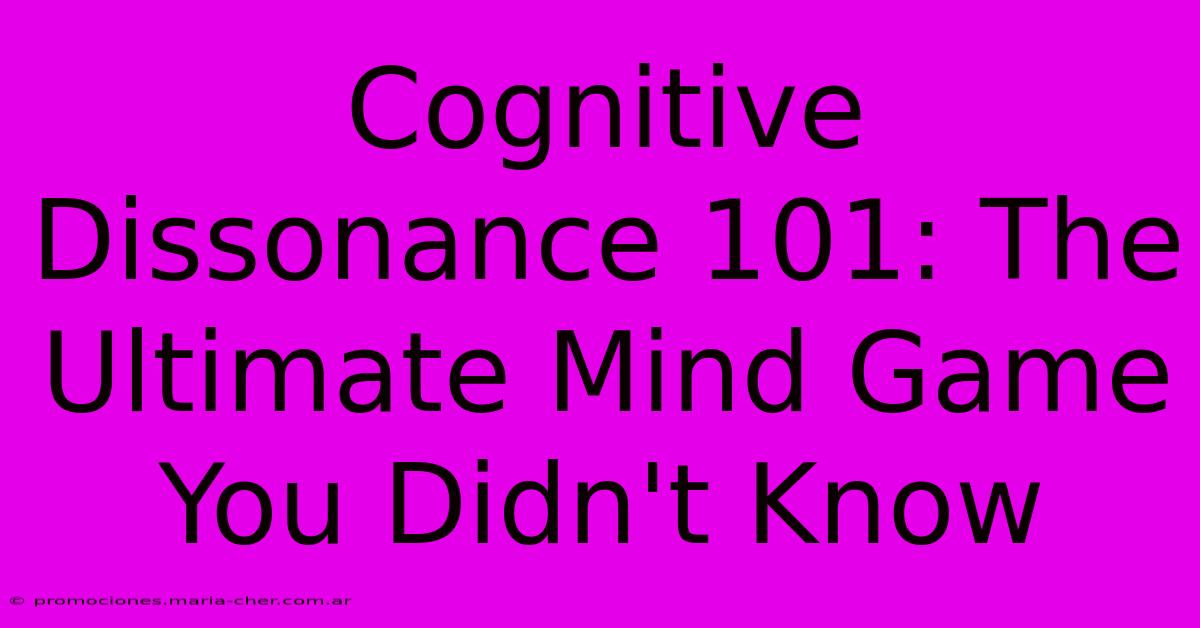Cognitive Dissonance 101: The Ultimate Mind Game You Didn't Know

Table of Contents
Cognitive Dissonance 101: The Ultimate Mind Game You Didn't Know
We all experience it, though most of us don't even realize it. That unsettling feeling when our beliefs clash with our actions, or when we hold two contradictory ideas simultaneously. This, my friends, is cognitive dissonance. It's a fascinating psychological phenomenon, and understanding it can be a game-changer in navigating your own thoughts and behaviors, as well as understanding others'.
What is Cognitive Dissonance?
Simply put, cognitive dissonance is the mental discomfort experienced by a person who holds two or more contradictory beliefs, ideas, or values. This discomfort arises when we act in a way that contradicts our self-image or deeply held beliefs. Think of it as your brain's internal conflict detector. It's not a pleasant feeling, and our minds are wired to resolve it in various ways.
Leon Festinger, a prominent social psychologist, is credited with developing the theory of cognitive dissonance in the 1950s. His research highlighted how powerful this internal conflict can be and the lengths we'll go to alleviate it.
Examples of Cognitive Dissonance in Everyday Life:
- Smoking: Knowing that smoking is harmful to your health while continuing to smoke creates significant cognitive dissonance. The smoker might rationalize their behavior ("I only smoke occasionally," "It helps me relax," etc.) to reduce the discomfort.
- Environmental Concerns: Feeling strongly about environmental protection but driving a gas-guzzling car creates a dissonance. The person might justify their actions by saying they recycle or donate to environmental causes.
- Relationship Conflicts: Staying in a toxic relationship despite knowing it's unhealthy generates dissonance. Justification might involve minimizing the negative aspects of the relationship or believing things will improve.
- Diet and Exercise: Intending to lose weight but regularly indulging in unhealthy foods and avoiding exercise is a common example. People often rationalize this by blaming a busy schedule or genetics.
How We Reduce Cognitive Dissonance:
Our minds are remarkably adept at resolving this internal conflict. We use various strategies, often subconsciously, to reduce the discomfort:
1. Changing Our Beliefs:
This is the most straightforward approach. If our actions contradict a belief, we might simply change the belief to align with our behavior. For example, a smoker might start to believe that the health risks of smoking are exaggerated.
2. Changing Our Actions:
Alternatively, we might alter our behavior to match our beliefs. In the smoking example, this could involve quitting smoking.
3. Adding New Beliefs:
This involves rationalizing our behavior by adding new beliefs that justify it. The smoker might say smoking helps them manage stress.
4. Minimizing the Importance of the Conflict:
We might downplay the importance of the conflicting beliefs or actions. A person in a toxic relationship might say, "It's not that bad," or "No relationship is perfect".
The Power of Cognitive Dissonance in Marketing and Persuasion:
Understanding cognitive dissonance is a powerful tool in marketing and persuasion. Marketers often use techniques that create a slight dissonance in consumers, then offer their product as a solution. For example, highlighting a problem (e.g., unhealthy skin) and then offering a product that solves it (e.g., a skin cream).
Overcoming Cognitive Dissonance:
While cognitive dissonance is a natural psychological process, becoming aware of it is the first step to managing it more effectively. By acknowledging the discomfort and actively examining the underlying beliefs and behaviors, you can make more conscious choices that align with your values and goals. This involves self-reflection, honest self-assessment and a willingness to make changes.
Conclusion:
Cognitive dissonance is more than just a psychological curiosity; it's a fundamental aspect of human behavior that shapes our beliefs, actions, and decisions. By understanding how it works, we can gain valuable insights into our own minds and those of others, ultimately leading to more conscious and fulfilling lives. Learning to manage cognitive dissonance can be a significant step toward personal growth and self-awareness. So, next time you feel that nagging sense of unease, remember it might be your brain’s way of telling you something needs adjusting.

Thank you for visiting our website wich cover about Cognitive Dissonance 101: The Ultimate Mind Game You Didn't Know. We hope the information provided has been useful to you. Feel free to contact us if you have any questions or need further assistance. See you next time and dont miss to bookmark.
Featured Posts
-
Wireframes Gone Wild Discover The Treasure Trove Of Data At Your Fingertips
Feb 07, 2025
-
Decoding Times Fractal Spiral From Pine Cones To The Cosmos
Feb 07, 2025
-
Uncover The Sneaky Tactics How Advertisers Manipulate Your Mind With Fallacies
Feb 07, 2025
-
Divulge The Secrets Of Visconti Sforza A Tarot Masterclass For Seekers
Feb 07, 2025
-
Gritty Decadence Unveil The Power Of Texture In Photography
Feb 07, 2025
